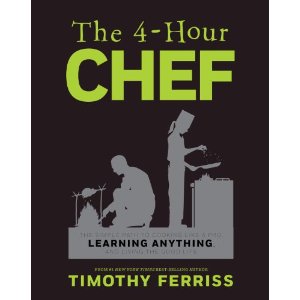+++ categories = ["Food"] cover_image_url = "https://res.cloudinary.com/renaissance-ninja/image/upload/v1410385362/4-hour-chef-cover_k6bo0n.jpg" date = "2012-11-26T00:00:00.000Z" tags = ["Books", "learning", "food"] title = "The 4-Hour Chef (semi-review)"
+++
(Disclosure: The included links to the book, including on the image above, to Amazon are affiliate links. No obligation at all to use my link if you're going to buy the book, but if you do the proceeds from the sale will go towards paying for the hosting costs of this site.)
I heard about Tim Ferris's new book, The 4-Hour Chef, while listening to his recent interview with Robb Wolf on the Paleo Solution podcast. I was going to add it to my never ending list of books to get later, but I saw that it was $5(!) on Kindle. Hearing that there was also a section on learning (languages in particular) was the only excuse I needed to grab it. Easily my best $5 purchase ever, and it would easily be worth the hardcover price ($21 at the time of this post) for sure.
The book is almost 700 pages long and I devoured the whole thing in less than three days - a blistering pace even by my standards. It is packed with information. According to the Kindle site I already have 75 highlights just from the first read through. I've only started to implement some of the smaller tips from the book and am loving those already. If you're even vaguely interested in cooking, or hell, just learning better and faster, then this book is well worth the investment.
Rather than doing a lengthy review (yes, it's already long, now imagine a full review), I'll just highlight some stuff I enjoyed from the different sections; there are 5 in total: Meta-learning, domestic, wild, the scientist, and professional, plus a hefty appendix (including a segment with 193 short-form recipes, one per country).
Note: As some reviews mention, the Kindle version has some small text on images and some odd formatting, but it didn't interfere much with my enjoyment of the book.
Meta
The entire meta section is fascinating to me; that might be because I've gained an interest in becoming more of a polymath (somewhat by necessity), so finding ways to optimize learning is always super useful for me. The language learning stuff is amazing, but greatest part of the meta section was Tim's detailed description of his learning framework. Just as the teaching framework I learned during the MovNat certification can be applied to all movement, the same can be said for Tim's framework and learning anything. I won't truly know how effective it is until I test it myself, so as Bruce Lee would say, "Knowing is not enough; we must apply. Willing is not enough; we must do."
Domestic
The domestic section is the meat of the cooking segment. The focus is on keeping all the meals simple and gradually introducing new principles, techniques, and tools. Sounds just like any good training program, right? In particular a few key principles introduced are using spice combinations to create regional/national flavors (there is a chart with ~30 of them), basic cooking techniques, knife skills, and later on using some more specific tools like immersion blenders. To make it more interesting Tim poses a challenge of hosting dinner parties at the end of each segment (three dinner parties total) to put all the new skills to the test. I'll be doing just that once I actually have a place of my own again.
Otherwise there are tons of little tips scattered about that I found really useful. Here are just a couple of them: using sherry vinegar instead of balsamic (most balsamic vinegar isn't the real stuff), using a garlic clove speared on a fork as a makeshift spatula, flash-cooling wine, and sealing avocados (and most fruit) in paper bag to ripen overnight.
Wild
This section gets a bit more random and has stuff not directly related to cooking, but all really interesting. I have the fewest highlights from this section, because most of the notable bits were entire sections. Stuff that caught my eye:
- Shelter construction
- Butchery (detailed instructions for chicken included).
- "Popping" a pigeon.
- All kinds of info on making and using fire (including ember cooking).
- Foraging for plants and cooking insects.
- Spit cooking squirrels. Alternative recipe with trout is also mentioned, in case you can't get your hands on nature's traceur. Scientist
The focus of the Scientist section is all about clever food modifications including creating gels, foams, powders, and other things. Nutella powder, olive oil gummy bears, and bacon infused bourbon. Need I say more?
Oh, near the end of the section he also has a bunch of food challenges, including the Turbaconepic from Epic Meal Time; just in case you wanted to do something completely nuts.
Pro
It's a bit harder for me to summarize the good stuff from the Professional section. Tim splits it into two parts, the essential skills for any chef and the "avant-garde" approach. The first section interests me the most, as I want to go beyond cooking good food and towards making excellent food,_ _which requires a mastery of the fundamentals. For now the second section serves to give me greater appreciation for the work of chefs that goes into crafting and presenting high quality dishes. As was the case with the Domestic section, Pro has a big emphasis on principles and the specific recipes are used as vehicles for teaching those principles and techniques.
Science ended with ridiculous eating challenges, so it should come as no surprise that Pro has to end with an epic cooking challenge. Impossible might be more apt. The challenge is carp à l'ancienne (why am I not surprised that the hardest possible recipe is French?). The ingredient list is a massive twelve pages long and the hands on cooking time is supposed to be twenty hours. I have a long way before it would even be sane to attempt that recipe, but damnit, challenge accepted!
Now if you'll excuse me I need to go back and read the book again to begin preparing. I have so much to learn before I even stand a chance of succeeding at that insane challenge.

